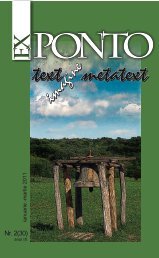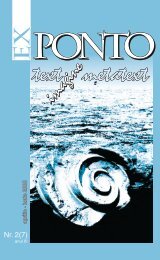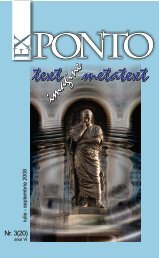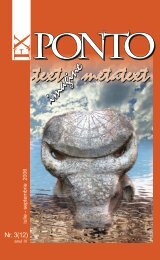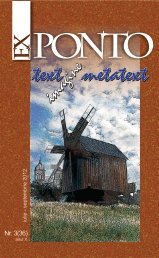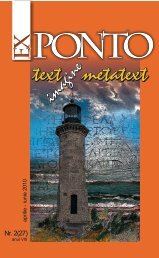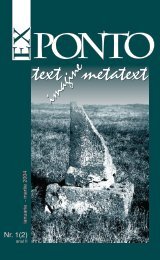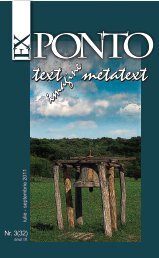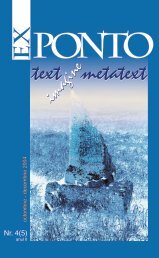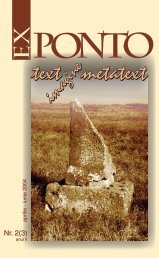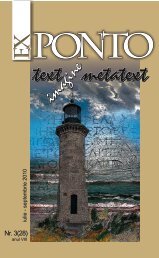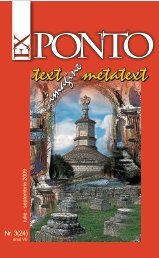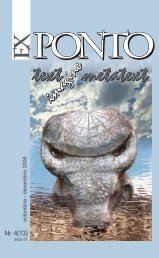Nr. 2 (19) anul VI / aprilie-iunie 2008 - ROMDIDAC
Nr. 2 (19) anul VI / aprilie-iunie 2008 - ROMDIDAC
Nr. 2 (19) anul VI / aprilie-iunie 2008 - ROMDIDAC
Create successful ePaper yourself
Turn your PDF publications into a flip-book with our unique Google optimized e-Paper software.
the musical phrases that the poem’s and the song’s ‘flesh’ consist of. This is<br />
what differentiates this poetry from jazz poetry, and rock from jazz. Corso’s<br />
poetry, just like rock music, usually has a steady time – marked by the tirelessly<br />
succeeding (even if sometimes imperfect or jagged) feet – whereas a poetry<br />
like Clark Coolidge’s for instance, very much similarly to jazz music, usually<br />
employs a flexible time.<br />
So when a poem or – in a wider context – a poetry is not explicitly talking<br />
about rock culture related items or does not meet the musical and cultural<br />
constraints (or better liberties) of a rock song – one could well-groundedly<br />
consider it as potential rock poetry after coming across relevant elements of<br />
popular and media culture, together with a liberal treatment of cultures high and<br />
low, as well as a modern prosody encouraging steady (even if imperfect or nonstandard)<br />
cadences while accommodating ‘classic’ forms in an unconventional<br />
manner – the “loose formalism” as defined above – or developing rhythms and<br />
other prosodic consistencies in original and/or rebellious ways – the “formal<br />
heterodoxy” as proposed and illustrated in this subchapter.<br />
Ex Ponto nr.2, <strong>2008</strong><br />
Works Cited<br />
Allen, Donald, Ed. The New American Poetry, <strong>19</strong>45-<strong>19</strong>60. Reprint Edition. Berkeley,<br />
Los Angeles, London: University of California Press, <strong>19</strong>99.<br />
Altieri, Charles. “Towards an Expressivist Theory of the Affects,” The University of<br />
Berkeley website, 2005, http://socrates.berkeley.edu/âaltieri/manuscripts/affects_2005.<br />
pdf.<br />
Bishop, Elizabeth. The Complete Poems, <strong>19</strong>27-<strong>19</strong>79. New York: Noonday,<br />
<strong>19</strong>83.<br />
Docker, John. Postmodernism and Popular Culture: A Cultural History. New York:<br />
Cambridge University Press, <strong>19</strong>95.<br />
Elledge, Jim, Ed. Sweet Nothings/ An Anthology of Rock and Roll in American<br />
Poetry. Bloomington and Indianapolis: Indiana University Press, <strong>19</strong>94.<br />
Ellman, Richard and Robert O’Clair, Eds. The Norton Anthology of Modern Poetry.<br />
Second Edition. New York, London: W.W. Norton & Co, <strong>19</strong>88.<br />
Gibb, Robert. The Burning World. Fayetteville, AR: University of Arkansas Press,<br />
2004.<br />
_____. The Origins of Evening. New York: W. W. Norton & Company, <strong>19</strong>98.<br />
Hamilton, Sharon. “Modern Poetry and Rock 'n' Roll? Comparing John Ashbery<br />
and Led Zeppelin” in Mid Atlantic Almanack volume 7, <strong>19</strong>98: 67-77.<br />
Kumin, Maxine, Blurb on The Burning World Poems by Robert Gibb, University<br />
of Arkansas Press webpage, 2004, http://www.uark.edu/âuaprinfo/titles/sp04/<br />
gibb_burning.html#excerpt.<br />
Lowell, Robert, Eds Frank Bidart and David Gewanter. Collected Poems. New<br />
York: Farrar, Straus and Giroux, 2003.<br />
Pareles, Jon. “Some Original Beatniks On a Trip To the Past” in New York Times.<br />
May 21, <strong>19</strong>94, Section 1, Page 13, Column 1.<br />
Scott, A.O. “A Life's Study/ Why Robert Lowell is America's most important career<br />
poet” in Slate, the June 2003 issue, e-edition http://www.slate.com/id/2084651/ .<br />
Shakespeare, William. Complete Works of William Shakespeare. London:<br />
Wordsworth Editions Limited, <strong>19</strong>96.<br />
130




